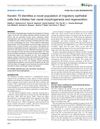Wound Healing With Topical BRAF Inhibitor Therapy in a Diabetic Model Suggests Tissue Regenerative Effects
June 2021
in “
PLOS ONE
”

TLDR A topical BRAF inhibitor, vemurafenib, can speed up wound healing and promote hair growth, especially in diabetic patients.
The study investigated the effects of a topical BRAF inhibitor, vemurafenib, on wound healing and hair follicle regeneration in diabetic and non-diabetic mice. The results showed that vemurafenib significantly accelerated wound healing and promoted hair follicle regeneration. The treated wounds displayed increased re-epithelialization, granulation tissue formation, collagen deposition, and thicker skin compared to the control group. The study also found increased expression of genes related to keratinocyte differentiation and hair follicle regeneration, and the presence of hair follicles in all vemurafenib-treated wounds. The study involved 6 replicates per group for the diabetic model and 4-9 replicates per group for the non-diabetic model. The findings suggest that topically applied BRAF inhibitors may enhance wound healing and induce regenerative healing by activating β-catenin signaling to induce hair follicle formation, particularly in diabetic patients.











